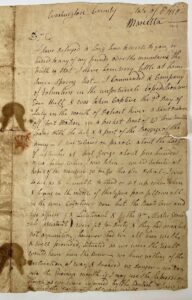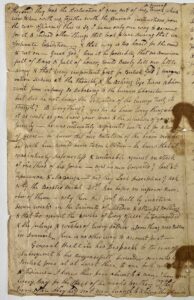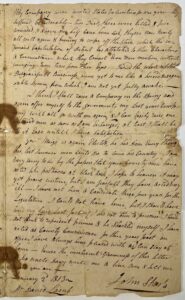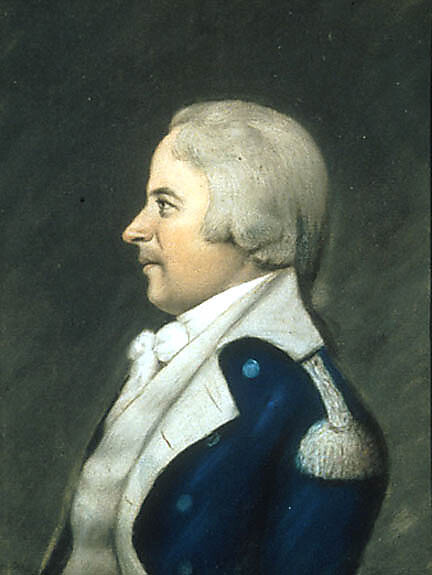Letter with outstanding content, written by Captain John Sharp, who effectively accuses his commander, Brigadier General William Hull, of treason in his surrendering of Detroit to the British General Brock and the Shawnee leader, Tecumseh. Sharp writes: “… great God! Can it be possible, that an American full of days and full of honor could basely sell our little army and that very important post for British gold?” Hull was later tried and convicted for cowardice and neglect of duty for surrendering Detroit, and sentenced to be shot (a fate commuted by James Madison). But Capt. Sharp seems to have believed, and firmly, that Hull’s motives were far more dishonorable and his actions deliberate. (Lot 111, The American Sale, March 18, 2023)
Washington County, State of Ohio
Marietta
Dr Sir,
 I have delayed a long time to write to you, or indeed to any of my freinds [sic] over the mountains, the truth is that I have been very little at home since spring last. I commanded the company of volunteers in the unfortunate expedition under [General William] Hull and was taken captive the 2d day of July in the mouth of Detroit River a short distance of Fort Malden in a packet boat [the schooner Cuyahoga] of 20 tons [?] loaded with the sick and a part of the baggage of the army. I was released on parole about the last of September at Fort George about 400 miles below where I was taken. We had embarked at rapids of the Maumee 70 miles this side Detroit. I was so sick as to be unable to stand or sit up when taken and lying in the middle of thirty five poor fellows all in the same condition. None but the boats crew and two officers (a Lieutenant and the Master General’s assistant) were fit for duty and they had arms but not ammunition, however had we all been well and well provided, situated as we were the result would have been the same. We knew nothing of the declaration of war, and dreaded no danger. We ran into the enemy’s mouth, if I may use the expression though as we were informed by the British officers we carried the declaration of war with us.
I have delayed a long time to write to you, or indeed to any of my freinds [sic] over the mountains, the truth is that I have been very little at home since spring last. I commanded the company of volunteers in the unfortunate expedition under [General William] Hull and was taken captive the 2d day of July in the mouth of Detroit River a short distance of Fort Malden in a packet boat [the schooner Cuyahoga] of 20 tons [?] loaded with the sick and a part of the baggage of the army. I was released on parole about the last of September at Fort George about 400 miles below where I was taken. We had embarked at rapids of the Maumee 70 miles this side Detroit. I was so sick as to be unable to stand or sit up when taken and lying in the middle of thirty five poor fellows all in the same condition. None but the boats crew and two officers (a Lieutenant and the Master General’s assistant) were fit for duty and they had arms but not ammunition, however had we all been well and well provided, situated as we were the result would have been the same. We knew nothing of the declaration of war, and dreaded no danger. We ran into the enemy’s mouth, if I may use the expression though as we were informed by the British officers we carried the declaration of war with us.
They said they took the declaration of war out of his (the Generals) trunk, which was taken with us, together with the Generals instructions from the war office. If this is so, I know only one way to account for it, and indeed other things that took place during that unfortunate expedition. And that way is too horrid for the mind to rest on — great God! Can it be possible, that an American full of days and full of honor could basely sell our little army and that very important post for British gold? Imagination sickens at the thought and the aching eye turns abhorrent from infamy so debasing to the human character. But did he not know the situation of the enemies fort, its strength? Its everything? Yes sir he knew every thing about it as well as you know your house and the situation of your family. He was intimately acquainted with it for a number of years. He knew that one battalion of the brave men he had with him would have taken Malden. He knew that it was entirely defenseless and untenable against an attack of one third of his force. Was his men cowards? [sic] Look at Tipacanoe [sic] and Magauga. Did they lack discipline? Ask why the boasted British 41st ran before an inferior number of them. Why then did General Hull ly [sic] inactive seven weeks in the vicinity of Malden and attempt nothing, and that too against the advice of every officer he commanded and the feelings and wishes of every soldier. “Something was rotten in Denmark.” There is no other way to account for it.
 General Hull in his dispatch to the war office subsequent to his disgraceful surrender overrated the British force at at least three to one, both whites and Indians. I knew thier [sic] force almost to a man. I seen them every day for the space of six weeks together I know that very often they had not man enough to relieve their guards.
General Hull in his dispatch to the war office subsequent to his disgraceful surrender overrated the British force at at least three to one, both whites and Indians. I knew thier [sic] force almost to a man. I seen them every day for the space of six weeks together I know that very often they had not man enough to relieve their guards.
My company were United States volunteers for one year. They suffered considerably. Two died, three were killed, five wounded and above one half came home sick, they are now nearly all well again and burning to wipe off the stain which the infamous capitulation of Detroit has attached to their characters, a circumstance which they cannot even now mention, without wringing iron tears from their eyes. Indeed the whole of the disgracefull bussiness [sic] seems yet to me like a horrid disagreeable dream from which I am not yet fully awake.
I think I shall raise a company in the spring and again offer myself to the government, my last year‘s company will all go with me again, and I can easily raise one hundred men as soon as I am exchanged; at least I shall be ill at ease until I have satisfaction.
 Gov Meigs is again elected, he has done everything this last summer man could do to serve his country. I am very sorry to see by the papers that your county men have acted like poltroons at Black Rock, I hope to have anything yet prove untrue, but I am fearful they have acted very ill. I have not been a candidate these four years for the legislature. I could not leave home, but I should’ve tried my hand last fall if I had not been a prisoner. I could not think to represent freemen and be shackled myself. I have acted as a county commissioner for three years past an office I have always been pleased with as I can stay at home. Excuse the incoherent gloomings of this letter and do Uncle Davy write me a line soon and tell me how you are.
Gov Meigs is again elected, he has done everything this last summer man could do to serve his country. I am very sorry to see by the papers that your county men have acted like poltroons at Black Rock, I hope to have anything yet prove untrue, but I am fearful they have acted very ill. I have not been a candidate these four years for the legislature. I could not leave home, but I should’ve tried my hand last fall if I had not been a prisoner. I could not think to represent freemen and be shackled myself. I have acted as a county commissioner for three years past an office I have always been pleased with as I can stay at home. Excuse the incoherent gloomings of this letter and do Uncle Davy write me a line soon and tell me how you are.
John Sharp
January 2, 1813
[to] Mr. David Lamb




